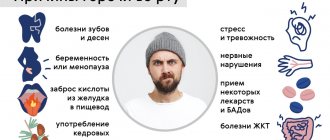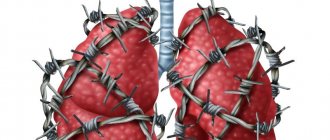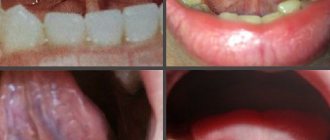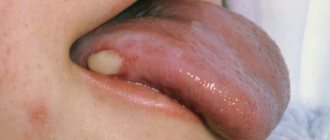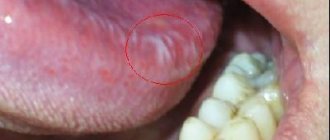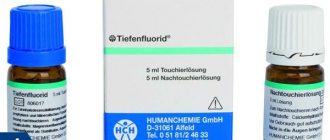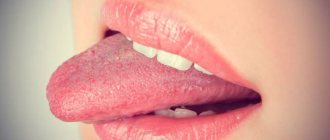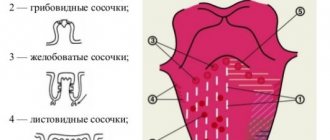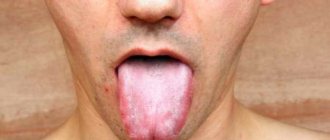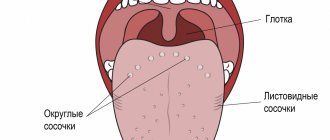206381
The tongue and oral cavity of a person are an indicator of the state of health, therefore, when diagnosing any diseases, doctors examine the condition of the patient’s pharynx.
Sometimes the clinical picture describes a burning or itching in the area of the sublingual cavity, on the outer surface of the tongue.
Despite minor discomfort, a thorough diagnosis should be carried out to differentiate typical dental situations from serious pathologies of internal organs or systems. Localized burning, itching and other unpleasant sensations are called glossalgia.
Predisposing factors
Itching and burning in the tongue area can occur for a number of reasons, so it is very important to conduct a whole range of studies to establish the true mechanisms of pathology formation.
General factors
Often, a burning sensation on the tongue is provoked by mechanical damage when the mucous tissues of the tongue are affected, leading to disruption of the capillary blood supply.
If the burning sensation from the tongue tends to generalize to the inside of the cheeks, palatine space and lips, then the development of stomalgia occurs. The disease occurs when mucous tissues are systematically traumatized by teeth with chips, cracks or sharp edges, braces or incorrectly installed fillings.
In addition to injuries, burning sensation can be caused by the following factors:
- reduction of gastric secretion up to 75%;
- Iron-deficiency anemia;
- B12-deficiency anemia (lack of vitamin B leads to deterioration of nerve conduction);
- gastroduophageal reflux of any origin;
- diabetic disease;
- some mental illnesses (innervation of nerve roots and processes increases during excitement);
- carrying out antihypertensive therapy (with long-term treatment with Capoten, Monopril, a short-term burning sensation may occur);
- active phase of the menstrual cycle in women;
- menopause.
Often, a burning sensation in the area of the tongue and sublingual cavity is recorded against the background of viral hepatitis of any group, pulmonary tuberculosis, cholecystitis.
When the hypothalamus is disturbed, damage to the autonomic nervous system occurs, which leads to a deterioration in blood microcirculation and the secretion of various glands, including salivary glands.
Therefore, with diabetes and other endocrinological diseases, dry mouth and burning sensation on the tongue are noted . Stress, overwork and emotional instability can provoke the occurrence of such a symptom.
Pathological causes
In dentistry, there are several main factors that cause dry mouth, soreness, burning of the tongue and discomfort in the oral cavity:
- Xerotomia. The symptom complex of xerotomy is expressed not only by dryness and burning in the tongue, but also by a disturbance in the secretion of the salivary glands.
On examination, cracks ranging from barely noticeable to pronounced deep are noted on the surface of the tongue. The burning sensation intensifies to the point of pain when the patient eats acidic foods, fresh fruits, carbonated or sour drinks. The etiology of xerotomia is often caused by dehydration due to intoxication, Sjögren's disease. - Candidiasis. Fungal infection of the oral cavity is always accompanied by unpleasant sensations in the form of itching, burning, pain in the areas of fungal rashes.
Candida fungus exists in all people, but under certain factors it turns into a pathogenic agent, causing diseases.Clinically, with candidiasis, the tongue is coated with a white, often dry coating, and the tongue area itself turns a rich bloody color. Along with itching and burning, patients experience severe pain on the tip of the tongue.
- Allergic reactions. Allergies and inflammation are often the body's reaction to foreign bodies in the oral cavity.
Thus, when installing braces, during prosthetics or osseointegration, as well as when wearing removable orthodontic structures, irritation may occur. Despite the hypoallergenic nature of modern materials, the likelihood of allergies, rejection and other unpleasant consequences of prosthetics is quite likely. - Deposits on tooth enamel. Insufficient care or lack of oral hygiene leads to the formation of stones on the inner surface of the tooth.
Hard plaque contains huge colonies of pathogenic microorganisms that release toxic components.Microbes provoke the development of inflammatory foci in the oral cavity, leading to chronic glossalgia. The condition is easily eliminated by hygienic teeth cleaning at the dentist.
- Epithelial leukoplakia. When the mechanisms of desquamation of epithelial structures at the cellular level are disrupted, as well as disruption of regenerative processes, it leads to the formation of white plaques on the cheeks, on the surface of the palate and tongue.
Often the course of the disease is latent with temporary episodes of exacerbation. Leukoplakia occurs more often in smokers, becoming a sign of a precancerous condition. - Herpetic rashes. Herpes is an infectious disease of a viral nature.
Once an episode occurs, it almost always leads to chronicity of the pathological process. The appearance of blisters on the mucous membranes of the throat indicates an exacerbation of the disease and requires immediate use of antiviral drugs. As the patient recovers, the blisters transform into small erosive lesions.
Almost all diseases of the oral cavity of any origin can cause glossalgia. This is due to the huge number of nerve roots and receptors in the tongue and sublingual cavity, including multiple capillary weaves.
All the pros and cons of piercing
The popularity of this form of piercing has deservedly gained popularity, because compared to many other options for decorating your body, it really has many advantages. Here are some of them:
- painlessness of the procedure when using anesthesia,
- the ability to easily and at any time hide the earring,
- low risk of complications, provided all sanitary requirements and procedure techniques are met,
- a chance to increase your self-esteem, do something original, decorate your body with spectacular jewelry,
- the ability to remove the earring at any time - the tongue has a tendency to quickly regenerate tissue, so such damage heals quickly and leaves virtually no traces.
However, along with obvious advantages, the fashion hobby also has its disadvantages. Thus, the disadvantages of piercing include long and rather painful healing, the appearance of speech defects, increased salivation, damage to tooth enamel, difficulty chewing in the early stages, as well as a likely negative reaction from loved ones and family members, if we are talking about very young people .
Tongue piercing allows you to stand out and increase self-esteem
“My friend once decided to pierce her tongue herself. I disinfected the large needle with something and did everything myself in front of the mirror. And it seemed normal, I went to bed, and then in the middle of the night I woke up from hellish pain and from the fact that it was difficult to breathe. The tongue was completely swollen, the parents immediately called an ambulance. Everything ended well, but personally, as they say, I still have an aftertaste..."
Olala, Krasnoyarsk, from correspondence on the woman.ru forum
In order for the procedure to go smoothly and without incidents, you should carefully choose the place where it will be carried out. Obviously, it would be better and safer to give preference to a trusted medical center that offers services of this kind.
Diagnostic measures
Diagnosis of pathology consists of a visual assessment of the oral cavity by the dentist. Additionally, you should visit an endocrinologist, neurologist or gastroenterologist. To clarify the general picture of the disease, the following tests should be performed:
- blood for detailed biochemical parameters;
- blood test for plasma glucose levels (for the possible development of diabetes mellitus);
- throat swab for laboratory testing;
- stool analysis for enterobiasis.
In case of a burdened clinical history, additional tests should be taken and examined by various specialists in the field to exclude exacerbation of other diseases of internal organs or systems.
Dangerous causes of blood taste in the mouth and ways to eliminate it.
Read here what can cause a white bump on the gum.
At this address you will find a complete list of human tongue diseases.
How long does it take for a piercing to heal?
For many who have already decided to decorate their tongue with a spectacular earring, the question remains open of how long it takes for the organ to heal after piercing. As a rule, the whole process lasts from 5 days to 2 weeks - much depends on the characteristics of the body.
Regarding how long the healing process takes, we figured it out. It remains to find out how long the tongue can hurt after a puncture. Unpleasant sensations and discomfort usually persist throughout the healing period. At first, a swollen organ may make it difficult to speak normally. Here it is extremely important to strictly follow all the instructions of the specialist who performed the puncture. Only if these conditions are met will the wound heal successfully within 10-14 days.
Therapy tactics
Treatment of burning sensation in the tongue area begins with sanitation of the oral cavity (treatment of caries, removal of tartar, hygienic cleaning of teeth, including periodontal pockets).
If you have dentures, braces and other orthodontic structures, they are checked and, if necessary, cleaned or replaced.
For stomatitis, gingivitis and other diseases of the mucous membrane, treatment is carried out. Treatment for glossalgia is prescribed only against the background of a completely healthy mouth.
Medication correction
Treatment is prescribed after the true cause of the burning sensation has been established. When the root cause is eliminated, glossitis usually goes away on its own.
The mandatory groups of drugs for the treatment of burning and other unpleasant sensations include:
- rinsing the mouth with antiseptics (Miramistin, Furacilin, Chlorhexidine aqueous);
- the use of ointments and solutions with Lidocaine, Novocaine (baby gels are suitable for teething).
If glossalgia is of a fungal nature, local medications based on active ingredients such as Clotrimazole and Nystatin are prescribed.
If the cause is bacterial, then Metrogil-denta and Metrogil gel are prescribed. If the causative agent of the burning sensation is viral agents, then it is advisable to prescribe Acyclovir, Florenal ointment, Oxolinic ointment.
Unpleasant symptoms are perfectly eliminated by means of systemic action: sea buckthorn oil, Actovegin gel, solutions of oils A or E. If respiratory disorders are noted against the background of glossalgia, it is recommended to take Hydrocortisone, Prednisolone.
All prescriptions are made by a doctor after a thorough diagnosis of the disease. In childhood, in the later stages of the disease, hospitalization may be necessary. Additionally, drugs from the group of corticosteroids may be needed.
Alternative medicine
With localized glossitis, without deterioration in general well-being, you can limit yourself to traditional methods of therapy at home.
In case of herpetic infection or the fungal nature of the disease, it is unacceptable to use alternative medicine recipes as monotherapy.
The main means for maintaining oral health include the following:
- Oak decoction. Decoction of oak bark (rinsing or internal use).
To prepare, grind 20 g of bark, place in a saucepan, add water and seal tightly with a lid. The container with the composition is boiled over a fire and infused. The finished broth is filtered and taken as a generous rinse several times a day. A fresh decoction should be prepared every day. To improve the therapeutic effect, the decoction should be warm. - Sage infusion. Sage is a powerful natural antiseptic.
Prepare the infusion as follows: place 20 grams of dry herbs in 200 ml of boiling water. The broth is infused for about 2-3 hours in a thermos or in a hermetically sealed pan, which can be wrapped in a terry towel and covered with pillows. Rinse the mouth with the prepared decoction several times a day. - Curd product. Cottage cheese is mixed with fat sour cream in a 1:1 ratio, wrapped in gauze and applied to the tongue for a long time. Sour cream softens mucous tissues, and cottage cheese acts on an absorbent principle.
- Herbal collection. To prepare the decoction, place yarrow, chamomile, sage, aloe, and calendula in equal proportions in a bowl of boiling water and leave for an hour.
After preparation, strain the mixture and rinse every 3 hours. The therapeutic effect is observed in the next 3 days. This decoction is a good addition to the main treatment. - Honey and chamomile. To prepare the product you will need a propolis tincture and a ready-made chamomile decoction. Add 15 drops of tincture to a warm herbal decoction (about 200 ml). Rinse your mouth with this mixture for 24 hours. Duration of treatment is 7-10 days. Not suitable for young children.
To achieve good therapeutic results, traditional medicine recipes should be taken adequately.
Thus, when serious diseases of internal organs or systems are manifested, as well as when dental conditions are registered, the use of chamomile decoction alone will not give the expected results. Treatment with traditional methods is often carried out only in combination with conservative therapy.
What can cause a metallic taste in the mouth and how to get rid of it.
This article contains material on the development and treatment of allergic stomatitis.
Follow the link https://www.vash-dentist.ru/lechenie/bolezni-polosti-rta/stomatit-bpr/lyugol.html and find out detailed instructions for using Lugol for stomatitis in a child.
Piercing as a source of pain
If we talk about the degree of pain of the procedure itself, then performing a tongue piercing is not a pleasant event. If a person becomes very nervous and twitches, causing the specialist to be unable to make an accurate puncture, everything will end with serious damage to an important organ. Therefore, many salons and medical institutions offering this service recommend using local anesthesia. Today, both injection and superficial methods of administering anesthetic are widely used.
Will my tongue hurt after a tongue piercing?
On a note! When choosing piercing under anesthesia, get ready for the fact that in the first couple of hours you will not have the opportunity to express yourself normally, since your tongue is unlikely to obey you. It is better to make sure in advance that someone you know is next to you. The effect of “freezing” will completely wear off only after 1-1.5 hours.
After the piercing, the tongue will still hurt and cause discomfort for some time. To relieve pain, you can take a painkiller tablet. This organ contains a huge number of blood vessels and nerve endings, so for another 2-3 weeks you will feel some soreness and swelling of the soft tissues. Be careful: if it doesn’t get better, the pain intensifies, becomes pulsating, you should see a doctor as soon as possible. Possible complications in this case include an allergic reaction to the metal and infection of the wound.
Unacceptable actions
If there is a burning sensation in the mouth, if there is damage to the mucous membrane of the pharynx, you should not do the following:
- eat hot or too cold food;
- drink sour drinks and fruits;
- include aggressive foods in the diet (sour, spicy, salty foods);
- chew chewing gum;
- brush your teeth with a paste that contains sodium lauryl sulfate;
- cauterize with alcohol compounds, brilliant green.
At the time of treatment, you should not visit crowded places (or wear a respiratory mask) or rooms with chemical dust.
During treatment, a protective regime should be observed to prevent diseases that weaken the general immune system.
Care instructions
Immediately after the procedure, at least for one day, you should give up solid foods and spicy dishes, as well as seasonings with strong specific tastes. Special care during this period involves regular rinsing with the use of pharmaceutical antiseptics and medicinal herbs - before this it is better to consult a doctor. It is also worth changing your toothbrush and then rinsing it thoroughly after each brushing. During daily hygiene procedures, you should thoroughly rinse your mouth, including under the tongue, but this should be done carefully, trying not to strain the organ too much.
It is important to follow all recommendations after the procedure so as not to encounter complications.
If you recently got your tongue pierced, take care of it while it heals. There is nothing complicated about it, but there are a number of restrictions that should be adhered to. Try to eat warm foods, not too cold or hot, and minimize any risk of accidental injury to oral tissue. Taking good care of your health will help prevent a lot of serious problems.
- According to the legislation of the Russian Federation.
Preventive actions
The main preventive measure is monitoring oral health, that is, timely visits to doctors, treatment of caries, and elimination of other dental diseases. Other measures include:
- complete healthy diet;
- brushing teeth 2 times a day;
- preventive examinations at the dentist at least 2 times;
- healthy lifestyle (disease prevention).
If there is a burning sensation in the tongue, it is important to avoid smoking and drinking alcohol. It is these toxic substances that can negatively affect not only the condition of the oral cavity, but also the health of the patient as a whole.
The video provides additional information on the topic of the article.
How to make a puncture
To know what to expect, you first need to find out exactly how the piercing procedure is performed. So, this process involves the following steps:
- to begin with, the tongue is placed in a special tool - a clamp, in the center of which there is a hole for decoration,
- after this, the master makes a puncture, for which he uses a special sterile needle intended for one-time use,
- a “barbell” is inserted through a special hole in the needle, after which the needle and clamp are removed,
- after this, the oral cavity is treated with a disinfectant solution, for example, Chlorhexidine.
The photo shows the procedure for piercing the tongue.
If the procedure was carried out during the day, then in the evening the tongue will inevitably swell and cause some inconvenience. The speed of healing largely depends on the individual characteristics of the human body. For some, this process takes five days, for others – two weeks. Keep in mind that during this period you will have to exclude spicy foods and acid-containing foods from your diet, and, if possible, limit the consumption of solid foods. It is also recommended to talk less and move your tongue so as not to accidentally touch the wound.
Reviews
Burning and itching in the tongue area is a signal from the body about the beginning of a pathological process. It is necessary to begin timely and complete treatment to prevent all kinds of complications.
Considering the polyetiology of glossalgia, treatment should be carried out after a thorough examination. If you have had unpleasant sensations in the tongue area, you can share treatment methods and general well-being at that time in the form of comments below.
If you find an error, please select a piece of text and press Ctrl+Enter.
Tags medicines traditional medicine language
Did you like the article? stay tuned
Previous article
Superline implants - traditions of Korean quality
Next article
Classification of dental caries according to the Black scale
Tongue piercing – what consequences can a fashionable hobby lead to?
Piercing various parts of the body is a fashionable hobby that has become popular among young people for quite some time. Many people choose the tongue as the place for the piercing, since here the earring can always be hidden from prying eyes, for example, while studying or working. But it should be understood that decorating an organ presupposes its inevitable injury. Without a careful and responsible approach to the healing period, an infection can get into the wound, and problems cannot be avoided. Today we’ll talk about how piercing is done, what unpleasant consequences can occur, and what to do if your tongue hurts badly after the piercing.
